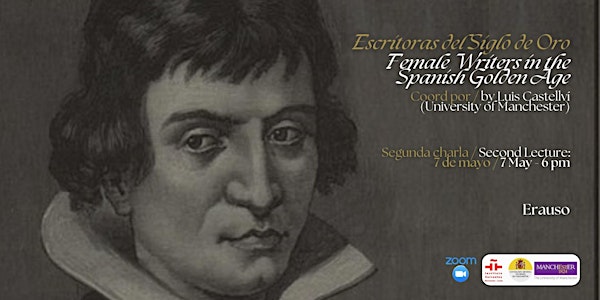
Female Writers in the Spanish Golden Age: Erauso
Exploring Spain's Golden Age literature through Sor Juana, Erauso, María de Zayas, and Santa Teresa.
Date and time
Location
Online
About this event
- 1 hour 30 minutes
In this series of four lectures, we will delve into the literary world of the Spanish Golden Age, understood as a transatlantic phenomenon. We will start with Sor Juana Inés de la Cruz, an icon of the Spanish-American Baroque and a key figure in colonial Latin American literature, who left behind a significant legacy not only in her books but also in the arts. Subsequently, we will explore the life of Erauso, also known as the Lieutenant Nun, whose autobiographical account challenges gender conventions and portrays a life marked by adventure and transgression. Maria de Zayas, a novelist and playwright, will guide us through a world of (proto)feminist fictions that subvert the literary standards of her time. We will conclude with Santa Teresa, whose personal experiences and mystical writings will transport us to a realm between the earthly and the spiritual. These four lectures will allow an analysis of the diversity of female voices and perspectives from a period marked by rebelliousness and creativity.
Second lecture
Erauso was born Catalina in San Sebastián (Spain) at the end of the 16th century and died Antonio in Cotaxtla (Mexico) in the mid-17th century. His autobiographical work, Vida y sucesos de la Monja Alférez [The Life of the Lieutenant Nun], was published in 1829. Catalina was never a nun, but a novice in the Basque convent where her parents placed her at the age of four. In her adolescence, she escaped and lived as a man for the rest of her life. He crossed the Atlantic several times and took part in the conquest of Chile. Although Erauso alternates between male and female grammatical genders, his Life does not portray an androgynous character but rather a hyper-masculinized one. This second lecture will centre on the first Spanish transgender person, who, not satisfied with identifying solely as male, even mirrored the actions of Cortés and Pizarro.
Luis Castellví Laukamp is a Lecturer in Spanish Cultural Studies at the University of Manchester. His teaching and research interests range widely but mainly focus on the literatures and cultures of early modern Spain, Latin America and the Philippines. Central to his academic work are the theories and practices of poetic influence and transmission of culture in the early modern Hispanic world. He previously taught as an Affiliated Lecturer at the University of Cambridge, where he earned his PhD, and was a Humboldt postdoctoral scholar at Heidelberg University. Author of Hispanic Baroque Ekphrasis (2020), which has been translated into Spanish. Anchored in the emerging field of Pacific Rim Studies, his current research is devoted to the first Spanish chronicles written in Asia.
Online Event
In Spanish (simultaneous interpretation into English).
More information: cultman@cervantes.es
En esta serie de cuatro charlas, nos adentraremos en el mundo literario del Siglo de Oro español, entendido como un fenómeno transatlántico. Comenzaremos con Sor Juana Inés de la Cruz, icono del Barroco hispanoamericano y figura clave en la literatura virreinal, quien dejó un gran legado no solo literario, sino también artístico. Posteriormente, nos adentraremos en la vida de Erauso, también conocida como la Monja Alférez, cuyo relato autobiográfico desafía las convenciones de género y muestra una vida marcada por la aventura y la transgresión. María de Zayas, novelista y dramaturga, nos guiará por un mundo de ficciones (proto)feministas que subvierten los estándares literarios de su tiempo. Concluiremos con Santa Teresa, cuyas experiencias personales y escritos místicos nos transportarán a un mundo entre lo terrenal y lo espiritual. Estas cuatro charlas permitirán analizar la diversidad de voces y perspectivas femeninas de un período marcado por la rebeldía y la creatividad.
Segunda charla
Erauso nació Catalina en San Sebastián (España) a finales del siglo XVI y murió Antonio en Cotaxtla (México) a mediados del XVII. Su autobiográfica Vida y sucesos de la Monja Alférez fue publicada en 1829. Catalina nunca fue monja, pero sí novicia en el convento vasco donde sus padres la internaron a los cuatro años. En la adolescencia escapó y vivió como hombre el resto de su vida. Cruzó el Atlántico varias veces y participó en la conquista de Chile. Aunque Erauso alterna los géneros gramaticales masculino y femenino, su Vida no retrata a un personaje andrógino sino hipermasculinizado. Esta segunda charla se centrará en la primera persona transgénero española, a quien no le bastó con identificarse como hombre, sino que emuló nada menos que a Cortés y a Pizarro
Luis Castellví Laukamp es profesor de Estudios Hispánicos en la Universidad de Manchester. Sus intereses docentes e investigadores son amplios, pero se centran principalmente en las literaturas y culturas de la España del Siglo de Oro, América Latina y Filipinas. Un eje central de su investigación lo conforman las teorías y prácticas de la influencia poética y la transmisión cultural en el mundo hispánico del Siglo de Oro. Antes de Manchester, el Dr. Castellví fue profesor afiliado en la Universidad de Cambridge, donde se doctoró, e investigador postdoctoral Humboldt en la Universidad de Heidelberg. Es autor de Hispanic Baroque Ekphrasis (2020), traducido al español. Su investigación actual, anclada en el campo emergente de los estudios de la cuenca del Pacífico, se dedica a las primeras crónicas asiáticas escritas en español.
Actividad en línea y en español (con traducción simultánea al inglés).
Más información: cultman@cervantes.es
Want to learn Spanish?
Why learn Spanish at the Instituto Cervantes?
We have online and in-person language classes for all levels. See our schedule here.
Organised by
The Instituto Cervantes, the official Spanish Government Centre, is a public institution founded in 1991 to promote Spanish language teaching and knowledge of the cultures of Spanish speaking countries throughout the world.